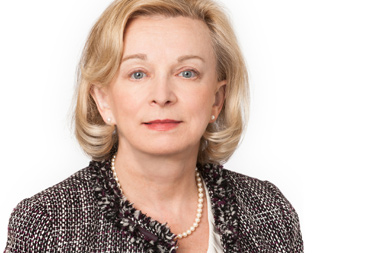Moya Greene tackles "negative" perceptions of female ambition

Social attitudes must evolve to be more effective at inspiring women, says Royal Mail chief executive
Jermaine Haughton
British society needs to change the way it talks about women in business, if it is to tackle the gender discrepancy in public companies’ boardrooms: that is the message from Royal Mail chief executive Moya Greene. At this week’s launch of leading headhunter Egon Zehnder’s new 25 By 25 scheme to boost female presence on boards, Greene said that dismissive attitudes aimed at women from an early age end up holding them back later on. “People ascribe negative qualities to women who reveal they have ambition,” she argued. “It’s doubly difficult to get the numbers to change if people don’t think they can do the job.”
To illustrate the challenge, Greene recalled a meeting she attended during last year’s privatisation of the Royal Mail, which included 111 representatives of the banking industry. “There were two women,” she said, “and they were not allowed to say one word.”
Four years into her role at Royal Mail, Greene has proven an exemplary leader, overseeing the firm’s listing on the London Stock Exchange and delivering it into profitability. A recent study of work performance evaluations conducted by Fortune supports Greene’s claims that women with leadership ambitions are constantly thwarted by negativity. Based on an analysis of 177 reviews, the research found that the word “abrasive” was used 17 times to describe 13 different women – but not used for men. Furthermore, the study found, 76% of women received negative feedback, compared to 2% of men. Significantly, 98% of men received feedback that could be described as constructive, but that was true for just a quarter of women.
The 25 By 25 scheme is campaigning to ensure that by 2025, at least 25% of FTSE 100 chief executive posts will be occupied by women. At present, there are only five women in such roles: Carolyn McCall of Easyjet, Véronique Laury of Kingfisher, Olivia Garfield of Severn Trent, Alison Cooper of Imperial Tobacco and Greene herself. Leading by example, Greene has boosted the number of females within her executive team to comprise a third, including chief operating officer Sue Whalley.
Urging female professionals to make companies accountable for their lack of diversity, Greene wants each City worker to mentor “at least one, high-potential woman” and to “change the debate” about women in executive positions. “One of the most important things to do is to help women take ownership of their ambition and aspirations,” she said. “It's still disappointing when you see how young women view their ambition – and how others view that ambition. To be a CEO it’s really hard work and you really have to want to do it. For women, even in 2014, that can be a problem.”
Currently the percentage of women in board positions across the UK is 22.6% – a large rise from the 15.6% reported in 2012. But Egon Zehnder’s UK managing director Miranda Pode said that not enough progress had been made at the senior executive level, where women account for just 8.9% of positions. “We're capturing an initiative about making sure that you release the potential of all women in the workplace to rise to the senior positions they’re capable of,” said the former Sainsbury’s executive. “If there is a blocker to how [companies] view their female talent and don't recognise the talent when she's in front of them, that's going to limit their ability to release value.”
One of the significant barriers to female progression in the workplace can be women themselves, as suggested by a recent US study by Gallup, which showed that more women preferred to have male bosses than female ones. Such findings, Pode said, indicate that making women more confident in their leadership potential is a big challenge. “It's about identifying the potential among women early on in their career,” she said, “and helping them to identify with senior roles [so they can] see themselves in those positions.”
While gender diversity within Britain’s top public companies still needs improvement, recent strides on the continent have led women to account for more than 20% of seats on the boards of European companies. That compares with just 15.6% in 2012 and 8% in 2004, according to findings highlighted in Egon Zehnder’s 2014 European Board Diversity Analysis. Moreover, the UK is one of the top-five countries with the highest percentage of women on large company boards – a set that also includes Australia and France.
As such, the evidence suggests the combination of pressure from government and regulatory action, as well as media scrutiny, has pushed countries to make a proactive effort to employ women into prominent positions within their leading companies.
For more on these issues, check out the details of this forthcoming seminar arranged by the CMI Women in Management network.

Press & Media Enquiries
For more information or to request interviews, contact CMI's Press Team on 020 7421 2705 or email press.office@managers.org.uk


